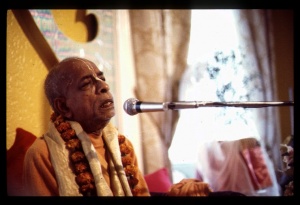SB 1.13.9 (1965)

A.C. Bhaktivedanta Swami Prabhupada
TEXT No. 9
Kaya vrittya vartitam vas charadbhi kshitimandalam Teerthani kshetramukhyani sevitani iha bhutale.
ENGLISH SYNONYMS
Kaya—by which. Vrittya—means, Vartitam—maintained livelihood, Vas—your good self, Charadbhi—while traveling, Kshitimandalam—on the surface of the earth, Teerthani—places of pilgrimage, Kshetramukhyani—the principal holy places, Sevitani—served by you, Iha—in this world, Bhutale—on this planet.
TRANSLATION
While travelling on the surface of the earth how did you maintain your livelihood and while doing so which of the principal holy places and pilgrimages on the earth you have served.
PURPORT
Vidura went out from the palace for detaching himself from the household affairs especially in the matter of political intrigues. As referred to hereinbefore, he was practically insulted by Duryodhone by calling him the son of a Sudrani although it was not out of place to talk loosely in the case of one's grandmother. Vidura's mother although a Sudrani she was grand-mother of Duryodhone and funny talks are sometimes allowed in the matter of grand-mother and grandchildren. But because the remark was actual fact and figure it was unpalatable talk for Vidura and it was accepted as direct insult for him. He therefore decided to quit his paternal house and prepare himself for the renounced order of life. This preparatory stage is called Vanaprastha Ashram or retired life for travelling and visiting the holy places on the surface of the earth. In the holy places of India like Vrindaban, Haridwar, Jagannath Puri, Prayag etc, there are many great devotees and still there are free kitchen houses for persons who desire to advance spiritually. Maharaj Yudhisthira was inquisitive to learn whether Vidura maintained himself by the mercy of the free kitchen houses (chhatras).